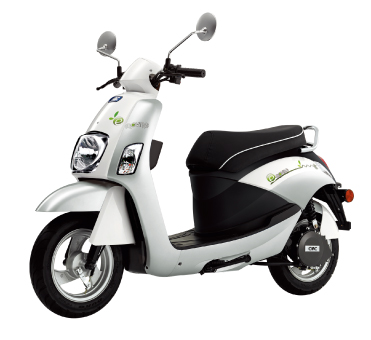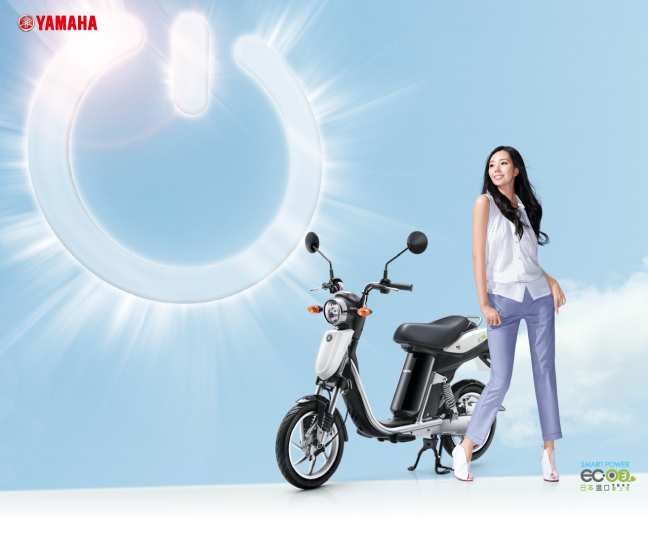Moving Fast: Sales of E-Scooters Accelerate in 2012
Government drives growth in nascent industry
2012/09/26 | By Quincy LiangTaiwan's Executive Yuan (Cabinet) hopes to have some 160,000 e-scooters on the roads by 2013. In late 2009 it mapped out the "Electric Scooter Industry Development and Promotion Plan" to promote e-scooters with lithium-ion batteries in Taiwan. The government not only wants to help develop the industry. It also aims to replace high-pollution internal combustion engine (ICE) powered two-wheelers (PTWs) with low-carbon vehicles. The government's goal is to change old habits in short-distance commuting and protect the environment.
According to the Intelligent Electric Vehicle Promotion Office (IEVPO) under the Industrial Development Bureau (IDB) of the Ministry of Economic Affairs, some 9,908 e-scooters have been sold in Taiwan and exported by local companies. Out of this total, 98% or 9,692 units have been TES (Taiwan E-Scooter Standard) certified, which qualifies them to receive government subsidies. The fact that most of the e-scooters sold in Taiwan in 2011 were TES certified shows that consumers want both the government subsidies and the vehicle quality and safety inspections.
| Vehicle Type | TES-Certified | Sales | Volume | Note |
Electric | Domestic | 7,453 | 1. TES certifiede-scooters can receive MOEA subsidies. 2. A total 18models have passed the TES certifications. 3. In 2010, domestice-scooter sales totaled 3,083 units. | |
| Export | 2,239 | |||
| Sub-Total | 9,692 | |||
NonTES-certified | Domestic | 216 | ||
| Export | 0 | |||
| Sub-Total | 216 | |||
Total | 9,908 | |||
| Source: IEVPO, Ministry of Transportationand Communications (MOTC). | ||||
The potential demand in the domestic market for e-scooters has arisen in conjunction with the government allowing gas prices to fluctuate freely with those of international crude oil. As of May 2012, the number of TES-certified e-scooter models has increased to 18. This includes 10 small/light models and eight light ones. The growth of e-scooters in the domestic market shows that more and more manufacturers are interested in them.
The TES motor power requirement for small/light e-scooters is between 650W to 800W, and battery capacity must be between 10Ah and 15Ah. TES requirements for light e-scooters include motor power under 1,800W and battery capacity between 20Ah and 24Ah.
In 2011, 94.7% of TES certified e-scooters sold in Taiwan were small/light models. The price of small/light models is about NT$20,000 (US$667) less than that of light ones, and they have lower power output and cruise range.
| TES-CertifiedE-scooter Models | |||
| Light E-scooter | |||
| TES-certified Model | Motor Power/Max. Speed | Battery Capacity/Cruise Range | Price |
| KYMCO Candy 2.0 | 1,800W/54 km/h | 20 Ah/43.7 km | NT$80,000 |
| SYM E-woo | 1,800W/50 km/h | 20 Ah/-- km | NT$67,000 |
| CMC e-moving plus | 800W/45.7 km/h | 10 Ah/47.8 km | NT$71,000 |
| E-Ton IBA3 | 2,000W/50 km/h | 24 Ah/50 km | NT$64,000 |
| Small/Light E-scooter | |||
| KYMCO Sunboy | 700W/41 km/h | 15 Ah/43.5 km | NT$52,000 |
| SYM e-star | 800W/45 km/h | 15 Ah/39.1 km | NT$49,000 |
| CMC e-Moving | 750W/45 km/h | 10 Ah/40 km | NT$56,000 |
| E-Ton e-MO | 750W/45 km/h | 10 Ah/40 km | NT$56,000 |
Source: IEVPO. | |||

CMC: A Leading Player
Taiwan-based automaker China Motor Corp. (CMC) of the Yulon Group (the largest automobile manufacturing conglomerate on the island) was the first to introduce a TES certified e-scooter model in the domestic market and has been rewarded with the largest market share. Although other major internal combustion engine (ICE) PTW makers such as KYMCO, SYM and Yamaha (Taiwan) also marketed their own products in 2011, their sales volumes have not caught up with those of CMC.
According to industry sources, major reasons why CMC has the largest market share include the first-mover advantage, fashionable product designs, aggressive marketing and the battery pack three-year guarantee. Other companies that offer competing e-scooters are still stuck in neutral because of distributors' doubts, low sales, and poor after-sales services.

Yamaha Taiwan has been vending an e-scooter model imported directly from Japan, and the market response from local consumers has been good.
In 2011, CMC sold 6,003 e-scooters and gained 79% of the market share, compared to Yamaha Taiwan's 7% (510 units), Kenfa's 2% (174 units), and others' 12% (892).
After the government liberalized local gas prices, which rose by more than 10% in late March, sales of e-scooters in Taiwan jumped to 1,141 units in March, compared to the average monthly volume of 406 in January and February. Industry sources have forecasted that e-scooter sales in April will also outstrip 1,000 units.
According to Automotive Research & Testing Center (ARTC), the largest transportation vehicle R&D and testing institute in Taiwan, in 2012 the government began to subsidize each e-scooter sold, contributing NT$12,000 (US$400), up 20% from NT$10,000 (US$333) in 2011. This is expected to further increase local e-scooter sales to between 18,000 and 20,000 units this year.




